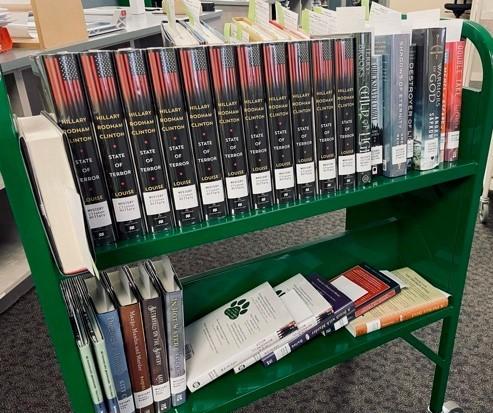Posted by Anne M on Wednesday, Oct 27, 2021
You may have heard the news stories listing shortages of paper, ink, cardboard, and shipping container space. Or the ones about labor shortages in warehouses and the shipping industry. And with books sales up 21% from 2019, there is more demand for print books at a time when publishers cannot fulfill their orders. Experts are calling it a "perfect storm" for the publishing industry.
If you've noticed that you are waiting much longer to get a book from us or seen the "on order" notice in our catalog linger with a specific title, this is why. Shifts in supply and demand are impacting libraries and our ability to get the book you want in your hands.

We focus on available stock when buying materials. We order months ahead of release dates and as many copies as we think will meet anticipated interest. We also write our customer service representatives from our vendors directly if we feel a title is unreasonably delayed. These are approaches we've always used, but don't always work if our vendor cannot get the books in the first place. Publishers are pushing back release dates and delaying or cancelling second printings. Libraries across the United States are feeling these shortages. Book stores, including our literary neighbors are impacted too.
Our staff work hard to unpack received items as quickly as possible and we move any titles on hold to the front of the line for cataloging and labelling. You can place a hold in our catalog to get the book as soon as possible. Thank you for your continued patience and hopefully these logistical problems will soon ease.
For more information about the current book crisis, Vox, The New York Times, and NPR have some good pieces explaining the issues in detail.


I feel like I’m reading a lot of fiction that takes on how to find meaning. These books begin with a divorce or a job loss or the death of a family member and the protagonist is trying to make sense of themselves now that their vision of who they are is no longer reality. “Creation Lake” is also about meaning, but “Sadie,” our narrator, is never who she is at any given moment. There is no sense of self—no past sense—no future self-aspirations. She is a spy that works for some multinational corporation or the like and she is who her alias is: someone who doesn’t really exist. This time she is infiltrating a rural French group opposed to corporate industrial agriculture and European Union trade agricultural regulations. It is just a job, one that involves building relationships, playing a part, instigating actions, and hacking emails. It’s this last task that moves Sadie to question herself for among the emails are missives from Bruno Lacombe, a hero of this group cooperative, who lives in caves and writes eloquently about the loss of things that make us human (I cannot detail the entire essence of his philosophy—you’ll have to read it). Sadie is so strong in her facade and skeptical of pretty much everything—does she even want meaning? This is a really compelling book. -Anne M